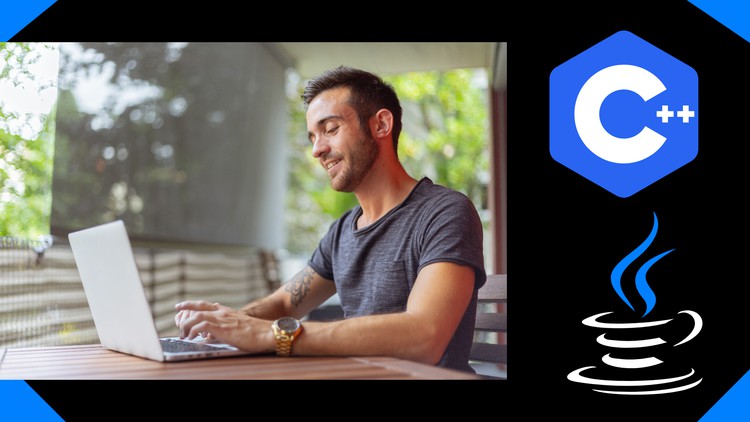
Learn C++ And Java Programming Complete Training Course 2022
What you will learn
Introduction to C++ And Java Programming In general
Theory And Practical demonstrations of C++ And Java Concepts
Learn about C++ And Java programming and the software’s interface
In C++ And Java, learn how to read complex data, create applications and graphic user interfaces by learning java programming language
Learn C++ And java Arrays, Lists and Structured Data Class ,Java: Discovering its Power Class
Learn java operators, java datatypes and java conditional statements
Description
C++ And Java Complete Training Course For Beginners
1) C++ Complete Course
This course is an introduction to the C++ programming language and its subset, the C++ programming language. Program structure, block, storage types, console and file I/O, functions, arrays, strings, pointers, call-by-reference, call-by-value, and dynamic memory allocation will be discussed. The concept and use of classes will be covered in some detail. The differences between C++ will also be discussed.
Course Rationale: This course is designed to teach students the C++ programming language and introductory and intermediate programming concepts with examples and applications using the C++ language. The course builds and extends topics covered in the prerequisite course, COSC 1315 and prepares students for more advanced programming courses such as ITSE 2431 (Advanced C++ Programming) and COSC 2415 (Data Structures) as well as for entry level programming employment. The course is required for an Associate Degree in several Computer Information Systems and Computer Science degree areas.
STUDENT LEARNING OUTCOMES/LEARNING OBJECTIVES
Course Objectives/Learning Outcomes:
- Demonstrate a thorough understanding of modular programming by designing programs that require the use of programmer-defined functions.
- Demonstrate a thorough understanding of arrays by designing and implementing programs that search and sort arrays.
- Demonstrate a thorough understanding of the object-oriented programming concepts of encapsulation, data abstraction and composition by designing and implementing classes including the use of overloaded functions and constructors.
- Demonstrate a thorough understanding of the concept of pointers and dynamic memory allocation by designing and implementing programs using pointers and dynamic memory allocation.
- Demonstrate a thorough understanding of the implementation of programmer-defined functions and classes by writing code, performing unit testing and debugging of multiple complex programs.
- Demonstrate good documentation style in all of the programs written in this course.
- Demonstrate proficiency in implementing data validation code, performing unit testing, and developing test plans while implementing robust solutions to the assignments in this course.
- Demonstrate a thorough understanding of stream input/output for both console and files.
- Demonstrate an understanding of the differences between C++ in the areas of strings, pass by reference/passing pointers, and structs by designing and implementing programs that use C++ strings, C++ language structs and classes.
- Learn in this Course
- To learn the fundamental programming concepts and methodologies which are essential to building good C++ programs.
- To practice the fundamental programming methodologies in the C++ programming language via laboratory experiences. …
- To code, document, test, and implement a well-structured, robust computer program using the /C++ programming language.
2) Java Complete Course
This advanced Java Certification Training is designed to guide you through the concepts of Java from introductory techniques to advanced programming skills. This Java course will also provide you with the knowledge of Core Java 8, operators, arrays, loops, methods, and constructors while giving you hands-on experience In java programming language.
In this course, students will learn fundamentals of Java programming. Using the Java Developmental Kit (JDK 6 SE), students will learn basic object-oriented formatting so they can move on to more advanced classes.
The curriculum for this course covers Java Remote Method Invocation (RMI), socket-based network programming, I/O files, serialization and the Java runtime environment. Students in this class also practice native methods, thread handling and synchronization.
The purpose of this course is teach students how to write programs in Java that will solve real world issues. After this course, students should be able to design software that solves problems on a scalable level.
This class furthers students’ knowledge of Java programming. Those enrolled will learn to manipulate and read data with more complex structure.
* Why This Course:
- 6 hours of Applied Learning
- Hands-on coding and implementation of each tutorial
- Lifetime access to self-paced learning
- Flexibility to choose careers in java.
* Java Course Contents:
Introduction To Java Programming:
Identifier rules
- Naming variables, constants (final) and references
- Primitive data types
- Arithmetic Operators
- Assignment Operators
- Relational and Logical Operators.
Thank you and see you inside the course.
Content